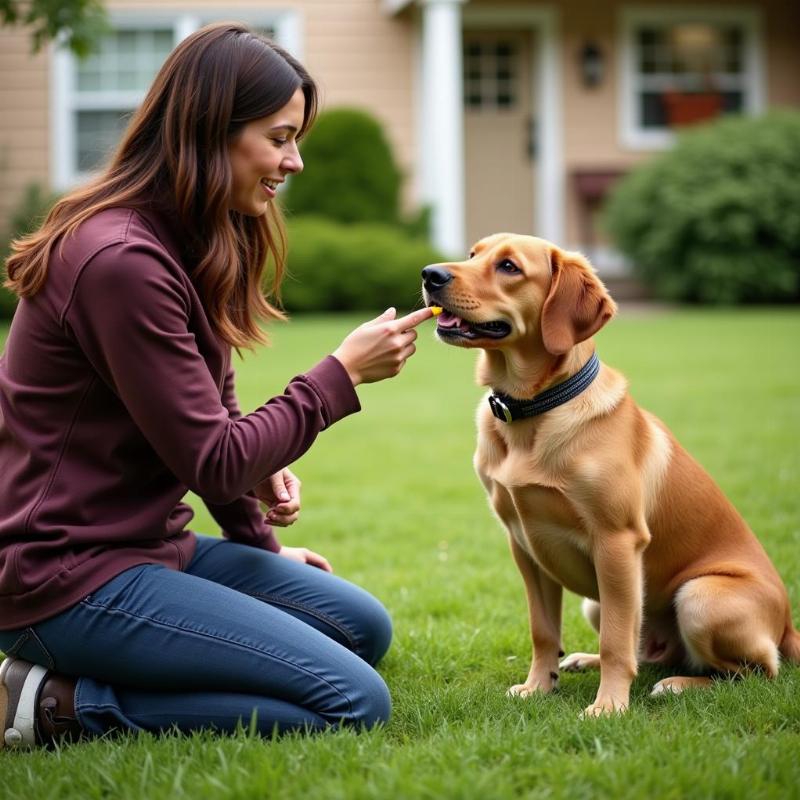Bringing your dog inside at night should be a simple routine, but what happens when your furry friend suddenly decides the backyard is the place to be after dark? This frustrating behavior, “dog refuses to come inside at night,” can be caused by a variety of factors, and understanding the root cause is key to finding a solution. This article will explore the common reasons why your dog might be resisting bedtime and provide practical solutions to help you regain control and ensure a peaceful night for both of you.
Why Your Dog Refuses to Come Inside at Night
There are several reasons why your dog might prefer the great outdoors, even when it’s time to sleep. These can range from environmental factors to underlying medical conditions. Let’s delve into the most common culprits:
Environmental Factors
- Exciting Smells and Sounds: The night brings a whole new array of interesting scents and sounds for your dog to explore. From the rustling of nocturnal critters to the fragrant trails left by other animals, your backyard can become a sensory playground.
- Temperature Preference: Some dogs, particularly those with thick coats, might find the cool night air more comfortable than the temperature inside your home.
- Fear or Anxiety: Loud noises like fireworks or thunderstorms can frighten your dog and make them reluctant to come inside. Similarly, anxiety triggered by separation from you can manifest as resistance to entering the house.
Medical Reasons
While less common, medical issues can also contribute to this behavior. Pain, particularly in older dogs, can make movement difficult and coming inside a painful chore. Cognitive decline, similar to dementia in humans, can also cause confusion and disorientation, leading to nighttime wandering. If you suspect a medical reason, consult with your veterinarian immediately.
Behavioral Reasons
- Lack of Training: If your dog hasn’t been consistently trained to come when called, they’re more likely to ignore your requests at night.
- Attention-Seeking Behavior: Sometimes, your dog might simply be enjoying the extra attention they receive when you try to coax them inside. This can inadvertently reinforce the behavior.
- Boredom or Lack of Exercise: A dog that hasn’t received enough physical and mental stimulation during the day might have excess energy to burn at night, making them less inclined to settle down indoors.
Solutions for Getting Your Dog Inside at Night
Now that we’ve identified potential reasons, let’s explore effective solutions for bringing your reluctant rover back inside:
Establish a Routine
Dogs thrive on routine. Set a consistent bedtime and stick to it. This will help your dog anticipate when it’s time to come inside.
Positive Reinforcement
Make coming inside a positive experience. Use high-value treats, praise, and even a favorite toy to reward your dog when they respond to your call.
 Training a Dog to Come Inside
Training a Dog to Come Inside
Address Underlying Fears and Anxieties
If your dog is afraid of loud noises or suffers from separation anxiety, address these issues with desensitization training or consult a professional dog trainer or veterinary behaviorist. Creating a safe and comfortable space inside can also help alleviate anxiety.
Ensure Proper Exercise and Mental Stimulation
A tired dog is a good dog. Make sure your dog gets plenty of exercise and mental stimulation during the day. This can include walks, playtime, and puzzle toys.
Create an Appealing Indoor Environment
Make the indoors more inviting. Provide a comfortable bed, access to fresh water, and engaging toys. You can also try leaving a piece of your clothing with your scent on it to comfort your dog.
Conclusion
Addressing your dog’s refusal to come inside at night requires patience and understanding. By identifying the underlying cause and implementing the strategies outlined above, you can establish a positive bedtime routine and ensure a peaceful night for both you and your furry companion. Remember, consistency is key.
FAQ
- My dog suddenly refuses to come inside, what should I do? First, rule out any medical issues. Then, try to identify any environmental or behavioral triggers.
- How can I make coming inside more appealing? Use positive reinforcement like treats and praise. Create a comfortable indoor space with a cozy bed and toys.
- What if my dog is afraid to come inside? Address any underlying fears with desensitization training and create a safe and comforting environment.
- Could my dog’s refusal to come inside be medical? It’s possible. Consult your veterinarian if you suspect a medical reason.
- Is it okay to leave my dog outside all night? It’s generally not recommended, especially in extreme weather or if your dog is prone to anxiety.
- How can I train my dog to come when called, even at night? Consistent training with positive reinforcement is crucial. Start in a controlled environment and gradually increase distractions.
- What if nothing seems to work? Consult a professional dog trainer or veterinary behaviorist for personalized guidance.
Related Articles
- dog refusing to come inside at night
- dog refuses to go in crate at night suddenly
- do you put food and water in dog crate
- dog won’t go to bathroom outside
Beautdogs.us is your premier online resource for all things dog-related in the US. We offer expert advice on dog breeds, care, and product recommendations. Whether you’re a seasoned pet parent or a new dog owner, Beautdogs.us is your trusted source for comprehensive and engaging information on canine companionship and care. Contact us today for personalized support! Email: [email protected], Phone: +1 501-555-7529. Visit Beautdogs.us for more information!